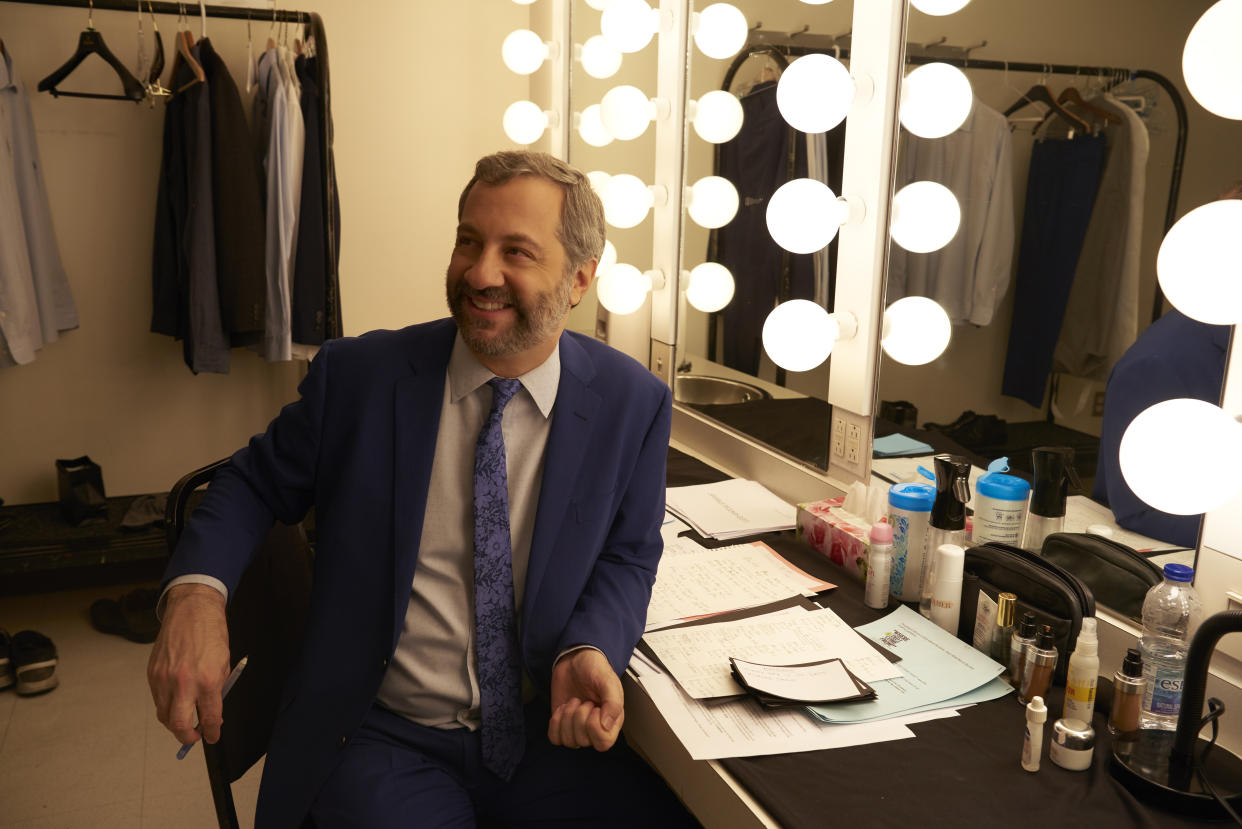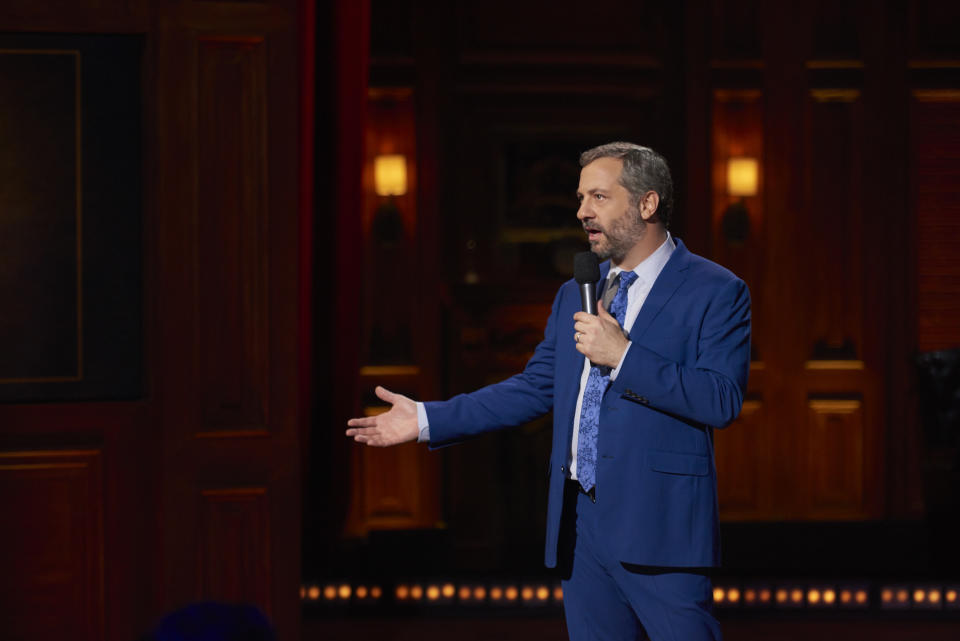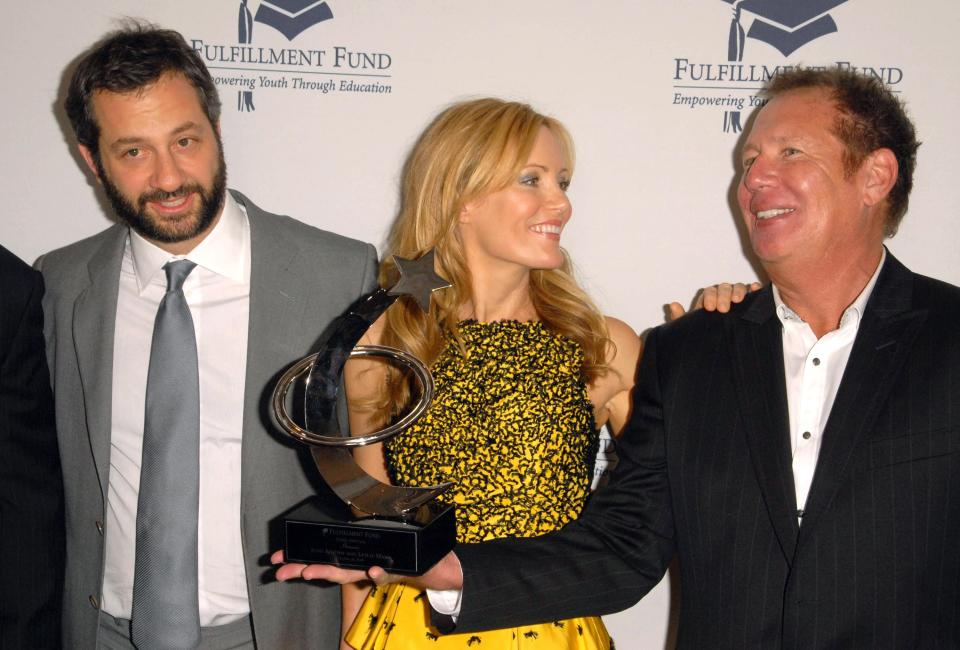Judd Apatow talks returning to standup and why his kids don't want to watch him tell jokes

The last time that Judd Apatow graced a standup stage, Bill Clinton was running for president, Aladdin and Home Alone 2 were the year’s top box-office grossers, and CBS still aired Sunday night movies. By the end of that positively prehistoric era known as 1992, the comic found himself at a career crossroads: Although he was making a decent living on the road, performing alongside such future superstars as Adam Sandler and Jim Carrey, he started to wonder whether performing was the best platform for his talents. Eventually, self-doubt and a negative review from Jim Henson, of all people, encouraged Apatow to cede the standup spotlight to his friends, while he headed into the writers’ rooms on such TV shows as The Larry Sanders Show and The Critic — formative jobs that eventually built him into one of the most powerful writer/directors in Hollywood.
Twenty-five years later, Apatow is exercising that power for a return to his first love in the new Netflix comedy special Judd Apatow: The Return, which premieres Dec. 12. Having already signed a deal with the streaming service in 2014 to executive-produce the series Love, Apatow tells Yahoo Entertainment that Netflix proposed the idea of The Return after catching a standup set he performed at the 2015 Just for Laughs Festival in Montreal.
“I had started doing standup again when we were shooting Trainwreck,” he says, referencing the hit comedy written by and starring Amy Schumer. “I told Netflix, ‘Give me a year,’ and then I got serious about trying to construct something I might be proud of.” After an intensive process of writing and honing his first standup set since ’92, Apatow stepped in front of the cameras — and a live audience — this past summer, filming several performances that were edited together to form one cohesive hour. “Most of it is from one show, but I was too scared to just tape one night,” he admits. “When I play tennis, I choke every time, so I needed several shots at this.”
There’s no choking in The Return, we’re happy to say. After some initial stiffness, Apatow warms up to his material with a great bit about how people used to share pictures before the days of Instagram and continues to land punch line after punch line from there. We spoke with him about being back in front of a crowd, how his two daughters, Maude and Iris, feel about being a source of Dad Joke material, and how he wants to be part of reforming the way our culture addresses sexual harassment going forward.
Yahoo Entertainment: Every comic has their own very specific process for writing new material. What’s your approach?
Judd Apatow: When we were shooting Trainwreck in 2014 in New York, I would go to the Comedy Cellar every night after we wrapped. I knew there would be a 15- to 20-minute drive to the club from the set and in that 20 minutes, I would try to think of something new to say and immediately try it. Writing standup can be done in many different ways. Most people won’t sit down at a computer and just try to write, like they’re writing a short story. You definitely can do it that way, but most people are just way too lazy. They say, “Oh, I just think of stuff when I’m on tage.” That’s really just an excuse to give yourself more time to binge Narcos! [Laughs]
What’s the difference between writing comedy now versus 25 years ago? Besides binge-watching Narcos, obviously.
When I was young, I didn’t have anything to say. I started doing standup when I was 17, and I did it until I was 24. I just didn’t have any strong opinions, and I didn’t have any great stories from my life. I also wasn’t especially angry about anything. Now that I’m about to turn 50, all sorts of stuff has happened to give me stories and make me angry! I have things I want to share with people. I feel like the standup is an extension of the ideas you see in my movies. People feel like they’re watching an extension of Knocked Up or This Is 40 in monologue form.

Because of that, it probably wasn’t as difficult to start writing jokes for yourself again as opposed to writing jokes for other people to deliver.
Yeah. It’s a lot of the same ideas. Most of what I write about is the attempt to be happy, and the attempt to figure out how to be a good person, as well as everything that goes wrong along the way. When I do standup, I’m not someone who has the answers. I’m always the person who’s wondering how badly I’m screwing up my children. [Laughs]
Trainwreck was when you started performing standup again, but I imagine making your earlier film Funny People reintroduced you to that world. Was that when you started seriously thinking about getting back to standup yourself?
I got burnt out from watching comedy nonstop from the time I was 10 until I was 24. For a decade, I didn’t pay any attention to anybody. Slowly, I began to realize that I had no idea what was happening in comedy clubs and in improv theaters. When I was writing [2009’s] Funny People, I started doing a little standup in order to write the jokes for Seth [Rogen] and Adam [Sandler]. That was the beginning of me realizing that it was my first love, and why I got into the business. It took a while for me to figure out a way to do it. Then, when I was working with Amy Schumer, she always seemed to be having so much fun doing standup. I think I just got jealous! Like, “Oh, we’re supposed to have a lot of fun making comedy?” I’ve been so stressed out trying to get everything done correctly that I wasn’t having as much fun as I wanted to have. Standup was a way to kind of reconnect with the joy of all of it.
When you were a younger comic, were you someone who vowed never to do material about your family life? That’s definitely a big part of this special.
I love comedians like Ray Romano who talk about raising kids. It’s a very weird era to be a parent because the world is changing so quickly, and technology is changing so quickly. I think parents are in a wide-eyed panic! We don’t know if the fact that our kids are addicted to these gadgets means that they’re going to survive in a new world or whether they’re just turning into idiots who will be able to accomplish nothing. It’s fun to talk about the fact that there is no playbook for the modern parent. We’re like, “Is it bad that my kids are on Snapchat all day? I don’t know. Maybe that’s how they talk to each other.” It certainly makes it much more challenging than it was for my parents, who I don’t think ever saw the inside of my high school.
Did you feel like you had to get permission from your daughters or your wife, Leslie Mann, to talk about them in your act? Did you run material by them?
They all saw the material at different times just coming to see me. When the special was done, I said to the whole family, “Do you want to see it to make sure you’re comfortable?” All three said no. Mainly due to a total lack of interest! Not one of them has watched it. I’d go so far as to say they may never see it, just because there’s something better on TV. No child wants to watch their dad talk for an hour. That would have been my nightmare: my dad having a special where he talked for an hour. There’s nothing I would rather see less than that. I support their lack of interest.
What jokes fell by the wayside as you honed your set?
I shot a lot of extra material. There was a long routine about me going to Taylor Swift concerts with my kids, and how they want me to not react to the show. I’m not allowed to be negative or positive. In fact, they’re more embarrassed if I’m having the time of my life. I have to go to the show and call zero attention to myself. So there’s a long standup discussion of that. They just want you to be the limo driver and pretend you’re not there.
Are you someone who is hyperaware of how the audience is reacting? Are you able to power through bits when they’re not working?
It’s very hard not to locate the one person in the club who hates you. I’ll say something, and maybe it’s borderline offensive, and I’ll find the one person that really didn’t like it. Sometimes I’ll just perform directly to that person. I’ll literally just look him in the eye for five solid minutes, just to see if I can get him back. That’s probably not the way you’re supposed to perform.
You’re very outspoken politically on Twitter and in public, and you do take some shots at Trump in the special. Was there more of that material at a certain point?
Any political material ages out very quickly. But I didn’t want to not mention that it would be better if we had a different president. It didn’t seem right to not get that on the record of where I stood in 2017. Still, you don’t want to talk about it too much, because the world changes so quickly that the material doesn’t make sense. You think you have a great new bit, but really you’ve just written something about the controversy of that week. There are so many [things] coming at people that they forget all the others. I’m glad that all the old George Carlin specials don’t have long bits about Jimmy Carter! [Laughs]
You tackle sexual harassment as well, and I’m sure that subject is very much on your mind given what’s happening in comedy right now. Is that something you were similarly concerned might date the material, though?
I had a long bit about Bill Cosby at one point. I thought, “Is this going to be old by the time the show airs?” Suddenly, it seems like it applies to everything else that’s going on right now. Unfortunately, that situation has just gotten worse and worse. That routine applies to more people than just him. I’m glad I’m talking about it.

Outside of standup, how you do see yourself as potentially being a voice in the industry on this issue or providing a voice to the victims? How do you see your role in this?
I think there’s a discussion about why high-level people didn’t step in to stop people who were committing crimes. That’s a very important conversation that people don’t want to have. I’d like to be a part of that going forward. We do need to talk about who knew, who could have said something, why didn’t they, and how can we create the conditions where in the same situation someone will now step forward where before they wouldn’t have. That’s important. A lot of people were happy to say, “It’s none of my business,” but the truth is, for certain people, it was their business. They could have warned other people, because it’s about protecting vulnerable men and women. When you ignore something, you’re allowing other people to get hurt. We want the whole community to want to protect each other.
It’s certainly not lost on anyone that people in the entertainment industry are losing their jobs over this, whereas that’s still slower to happen in politics.
People really want to hold onto power. People feel like their own power is at risk if they try to speak up too loudly about the misdeeds of others. There’s a lot of butt-covering that happens. People are very self-centered, in all industries and in politics. We have to figure out how we get people to speak up for what’s right. That’s why there aren’t more people speaking out against Roy Moore. It’s the same dynamic. People have their own personal goals and they’re not worried about other people. We have to change that. I think that change has begun.
Do you imagine Donald Trump stumbling upon The Return on Netflix and watching it?
I don’t have anything to say about that, really. He doesn’t seem like someone who’s looking for healthy criticism so he can do a better job.
What are the plans for your next feature film? The last script you directed, Trainwreck, was one you didn’t write. Are you working on your own script or are you open to directing someone else’s again?
I’m open to anything. I spent a lot of this year making a documentary about Garry Shandling, which is going to be on HBO in March. It’s a two-part, four-hour examination of his life called The Zen Diaries of Garry Shandling. I’m really excited for people to see that. I also made a documentary about this band the Avett Brothers, called May It Last. That’s going to be on HBO too. A lot of this year has been about making documentaries, which I really loved to do.
You had a close relationship with Shandling, but in doing the documentary, were there things about his life that surprised even you?
The point of the documentary is that most people didn’t really know who he was personally; he was a bit of a mysterious, mercurial fellow. This film answers a lot of the questions that people have about him. He kept diaries his entire life, and we track all the events of his life with the use of his own words from his diaries. He was successful from the ’70s through just a couple of years ago, so you also get to track what’s happening in each era of comedy.

While we’re talking about documentaries, you mention in The Return that you toured with Jim Carrey in the ’80s and ’90s, so I’m wondering if you’ve seen Jim & Andy: The Great Beyond, which is also on Netflix.
I love that documentary! I did a Q&A the other night interviewing Jim, the director Chris Smith, and Spike Jonze. In the documentary, you see Jim’s auditions to play Andy Kaufman, and I was the one shooting them at Jim’s house! He just got a camera and we worked on that one day. I got to visit the set and talk to Andy, when it was Jim not breaking character. It was deeply uncomfortable.
Looking back on it now, are you shocked by how far he went?
I remember that it was so funny to watch in person when he was doing it. If you visited the set, he would act like Tony Clifton for eight hours straight. He would just insult people relentlessly — way past the point where they were amused by it. It was a really wonderful, demented experiment. I think his work in the movie is incredible. That’s what Jim is about: He really commits to the premise of what he’s working on, and takes it as far as you can take it. When you make something about Andy Kaufman, the put-on is part of it.
Judd Apatow: The Return premieres Tuesday, Dec. 12, on Netflix.
Read more from Yahoo Entertainment:


